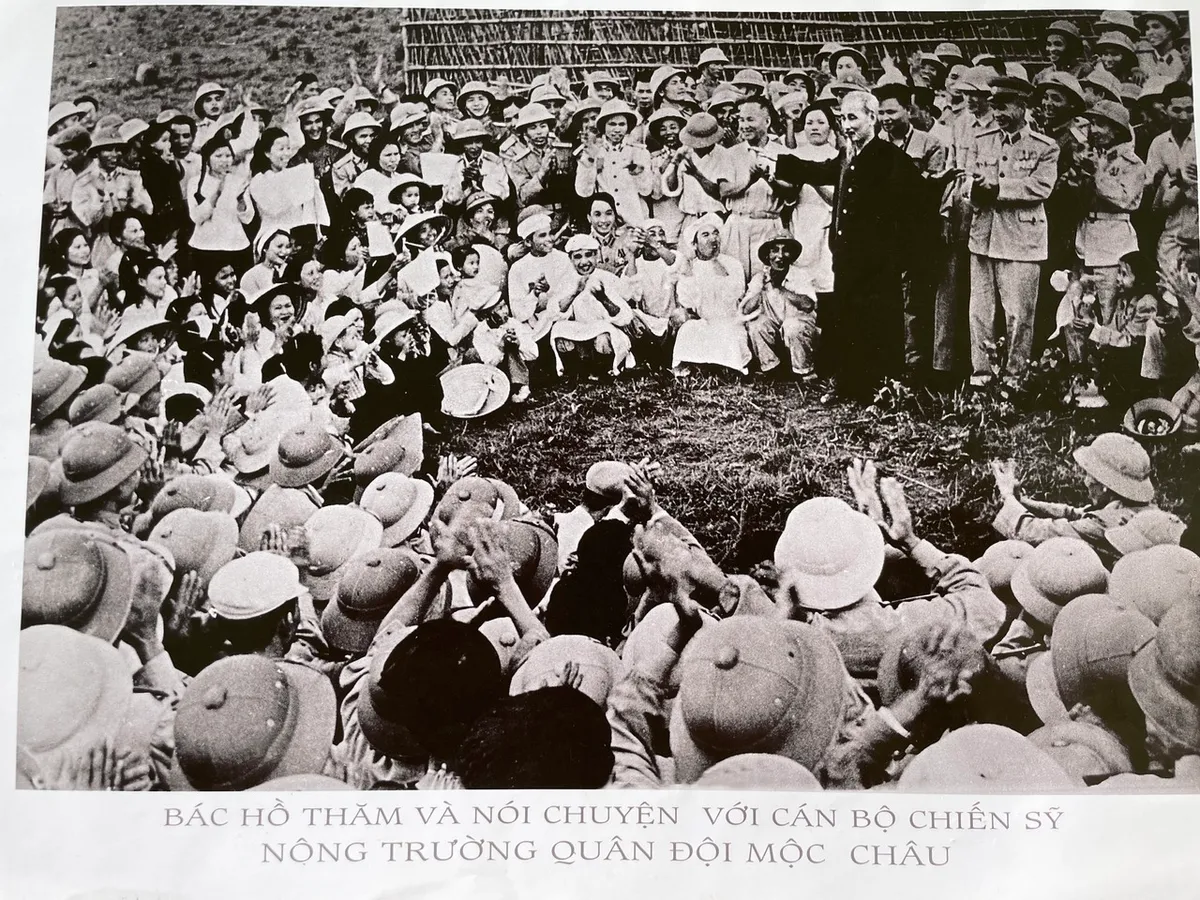Few would have imagined that today’s vibrant and flourishing Moc Chau Farm is the result of tireless efforts by soldiers and young volunteers who answered President Ho Chi Minh’s call.

President Ho Chi Minh visiting and speaking with officers and soldiers at Moc Chau Military Farm (Archival photo)
On May 7, 1959, in celebration of the 5th anniversary of the Dien Bien Phu Victory, President Ho Chi Minh and a delegation of central government officials visited and spoke with officials, soldiers, and people of Son La.
Responding to the call of the Party and President Ho Chi Minh, thousands of soldiers and young people from northern provinces traveled to the Northwest to help build Moc Chau Farm.
Nguyen Xuan Binh, born in 1932 and head of the liaison committee of Regiment 280, Division 335, recalled, “When President Ho visited the farm, he encouraged us to stay and build up the Northwest, to make the farm our home and the Northwest our homeland. Many of us, now over 60 years old, have continued to live here, and many engineers and doctors have grown up from Moc Chau Farm.”
Dang Duc Vinh was one of nearly 1,700 officers and soldiers from Regiment 280, Division 335, who volunteered to remain in the highlands to establish the military farm, the precursor to today’s Moc Chau Farm Town. He recalled, “President Ho left behind a handwritten note that was both an encouragement and a directive. We took it as our guiding principle for building the farm. We motivated each other to stay and develop the movement in line with his teachings.”
Following President Ho’s advice, in just the first five years after its establishment, Moc Chau State Farm reclaimed thousands of hectares of land for tea and food crops and improved pastures for cattle farming. The farm formed 31 production teams. Over the years, Moc Chau Farm has evolved and adapted to new realities, but regardless of the changes, the military farm’s legacy has been upheld, staying true to President Ho Chi Minh’s guidance.
After its privatization, Moc Chau Tea Company became part of Vina Tea under the Vietnam Tea Corporation. Today, numerous new tea varieties have been introduced, and Moc Chau’s tea products are exported worldwide, meeting higher standards and values than ever before.
Meanwhile, Moc Chau Milk has grown into a household name under Moc Chau Dairy Cattle Breeding Joint Stock Company. The farm now houses 25,000 cows, with an average milk yield of 25.18 kg per cow per day, and one hectare of pastureland generating over VND1 billion in income. With nearly 600 satellite farms supplying raw milk, the company’s annual milk production has reached 42,500 tons. Moc Chau Milk has become a national brand.
Pham Hai Nam, General Director of Moc Chau Dairy Cattle Breeding Joint Stock Company, stated, “Our company is now focusing on environmental sustainability, especially in livestock farming. We are developing farm models that integrate tourism into the national tourism chain of Moc Chau, attracting visitors to experience high-tech agriculture and industry.”
Today, Moc Chau District covers a total area of 1,072.09 km² and is home to 12 groups. After 66 years, President Ho Chi Minh’s words continue to hold immense value. Once a pioneering socialist production movement, Moc Chau is now emerging as a young town, a lush and livable highland, and a source of pride for Son La Province.
Moc Chau is not only recognized as the "Leading Regional Nature Destination in Asia," but in 2023, it was also honored at the highest level as the "World’s Leading Nature Destination." This recognition serves as a driving force for Moc Chau’s continued growth in tourism, fostering the development of eco-tourism and cultural preservation alongside its expanding resort industry./.
Compiled by BTA